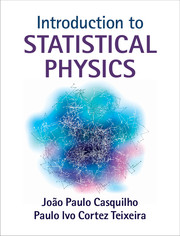Book contents
- Frontmatter
- Dedication
- Contents
- Preface
- Acknowledgements
- 1 Random walks
- 2 Review of thermodynamics
- 3 The postulates of statistical physics. Thermodynamic equilibrium
- 4 Statistical thermodynamics: developments and applications
- 5 The classical ideal gas
- 6 The quantum ideal gas
- 7 Magnetism
- 8 The Ising model
- 9 Liquid crystals
- 10 Phase transitions and critical phenomena
- 11 Irreversible processes
- Appendix A Values of some fundamental physical constants
- Appendix B Some useful unit conversions
- Index
Preface
Published online by Cambridge University Press: 18 December 2014
- Frontmatter
- Dedication
- Contents
- Preface
- Acknowledgements
- 1 Random walks
- 2 Review of thermodynamics
- 3 The postulates of statistical physics. Thermodynamic equilibrium
- 4 Statistical thermodynamics: developments and applications
- 5 The classical ideal gas
- 6 The quantum ideal gas
- 7 Magnetism
- 8 The Ising model
- 9 Liquid crystals
- 10 Phase transitions and critical phenomena
- 11 Irreversible processes
- Appendix A Values of some fundamental physical constants
- Appendix B Some useful unit conversions
- Index
Summary
Statistical physics is a core subject in any degree course in physics, engineering physics, or physics (or chemistry) for education. Its role is on a par with that of introductory quantum mechanics: both provide an essential background in the fundamentals of physics and are prerequisites for more advanced subjects such as atomic and molecular physics, condensed matter physics or solid state physics. On the other hand, statistical physics plays a central part in laying the foundations and enabling the interpretation of classical thermodynamics, the derivation of its laws and of results for model systems such as the classical ideal gas.
Statistical physics is also an excellent vehicle for introducing numerical simulation methods, which are ever more prevalent in physics and engineering. Indeed, computer simulations in statistical physics are playing an increasingly important role in the understanding of the properties and phase transitions of physical systems. Moreover, the computational techniques of statistical physics have been fruitfully applied to problems in many other fields, such as optimisation of assembly lines in an engineering context. Monte Carlo simulations of a number of model systems are, therefore, implemented in this course.
This book grew out of a set of lecture notes for the undergraduate statistical physics course and the graduate computer simulation methods course taught by one of us (J.P.C.) to physical engineering students at the School of Science and Technology of the New University of Lisbon, Portugal (FCT/UNL), in the years 2001–2008. In its final form, the book clearly comprises too much material for a one-semester course. This enables instructors to first cover the foundations of the subject, and then make a selection of more advanced topics, on the basis of their personal preferences and those of the group being taught. This English edition is a thoroughly revised and expanded translation, by the authors, of the Portuguese edition (IST Press, Lisbon, 2011); some of the original chapters have been broken up into shorter chapters, for a sharper focus and greater clarity.
- Type
- Chapter
- Information
- Introduction to Statistical Physics , pp. xiii - xivPublisher: Cambridge University PressPrint publication year: 2014

